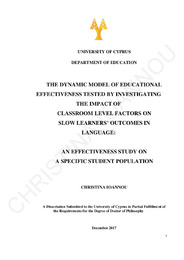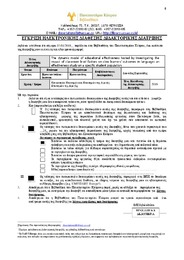| dc.contributor.advisor | Kyriakides, Leonidas | en |
| dc.contributor.author | Ioannou, Christina K. | en |
| dc.coverage.spatial | Κύπρος | el |
| dc.coverage.spatial | Cyprus | en |
| dc.creator | Ioannou, Christina K. | en |
| dc.date.accessioned | 2018-03-16T07:35:04Z | |
| dc.date.available | 2018-03-16T07:35:04Z | |
| dc.date.issued | 2018-01 | |
| dc.date.submitted | 2018-01-03 | |
| dc.identifier.uri | https://gnosis.library.ucy.ac.cy/handle/7/39731 | en |
| dc.description | Includes bibliographical references. | en |
| dc.description | Number of sources in the bibliography: 262 | en |
| dc.description | Thesis (Ph. D.) -- University of Cyprus, Faculty of Social Sciences and Education, Department of Education, 2018. | en |
| dc.description | The University of Cyprus Library holds the printed form of the thesis. | en |
| dc.description.abstract | Έρευνες διαχρονικά αναφέρονται σε Μαθητές με αργό ρυθμό μάθησης οι οποίοι αποτελούν ένα συγκεκριμένο μαθητικό πληθυσμό με σοβαρή δυσκολία να ακολουθήσουν το ρυθμό μάθησης της τάξης, με χαμηλές επιδόσεις σε όλα τα μαθήματα, με χαμηλά κίνητρα μάθησης και με υψηλό ποσοστό σχολικής αποτυχίας. Δυσκολεύουν την διδασκαλία στην τάξη και διαχρονικά αποτελούν σοβαρό πρόβλημα για την εκπαίδευση. Για τον εντοπισμό και την αναγνώριση τους επικρατούν δύο κύρια κριτήρια, το ένα αφορά την νοητική τους λειτουργία η οποία υπολογίζεται να κυμαίνεται περίπου στο 70 με 90 IQ με ψυχομετρική μέτρηση και το άλλο τη διαχρονικά χαμηλή μαθησιακή τους επίδοση σε όλα τα μαθήματα. Νοητικές και μαθησιακές αναπηρίες αποκλείονται από τον ορισμό.
Δεν υπάρχουν δεδομένα που να αναφέρονται στην αποτελεσματικότητα του εκπαιδευτικού. Συνεπώς, διαχρονικά στην πράξη οι εκπαιδευτικοί φαίνεται να μην γνωρίζουν τα στοιχεία της διδασκαλίας τα οποία πιθανόν να αυξάνουν τα μαθησιακά επιτεύγματα του συγκεκριμένου μαθητικού πληθυσμού. Επιπλέον διαφαίνεται ότι δεν υπάρχουν έρευνες που να συνδέουν το εύρος της επίδρασης των εκπαιδευτικών στα μαθησιακά αποτελέσματα των μαθητών με αργό ρυθμό μάθησης.
Στην έρευνα με βάση το θεωρητικό υπόβαθρο της Έρευνας Εκπαιδευτικής Αποτελεσματικότητας και συγκεκριμένα του Δυναμικού Μοντέλου Εκπαιδευτικής αποτελεσματικότητας διερευνάται το μέγεθος της επίδρασης των παραγόντων αποτελεσματικότητας στο επίπεδο της τάξης στα γνωστικά αποτελέσματα των μαθητών με αργό ρυθμό μάθησης.
Τέθηκαν τρία ερευνητικά ερωτήματα:
Ποιοι από τους παράγοντες αποτελεσματικής διδασκαλίας του ΔΜΕΑ σχετίζονται θετικά με τα μαθησιακά αποτελέσματα των μαθητών με αργό ρυθμό μάθησης;
Οι παράγοντες αποτελεσματικής διδασκαλίας έχουν την ίδια επίδραση στα μαθησιακά αποτελέσματα των μαθητών με αργό ρυθμό μάθησης;
Ποιες από τις πέντε διαστάσεις μέτρησης των παραγόντων αποτελεσματικής διδασκαλίας έχουν μεγαλύτερη επίδραση στα μαθησιακά αποτελέσματα των μαθητών με αργό ρυθμό μάθησης;
Για την διεξαγωγή της έρευνας συλλέγηκαν δεδομένα από δύο επίπεδα, των εκπαιδευτικών και των μαθητών. Τα δεδομένα που αφορούσαν τους μαθητές (νοητικό επίπεδο και γνωστικά επιτεύγματα) συλλέγηκαν αρχή και τέλος της σχολικής χρονιάς 2014-15. Τα δεδομένα που αφορούσαν τους εκπαιδευτικούς (ποιότητα της διδασκαλίας) συλλέγηκαν με τη μέθοδο της παρατήρησης κατά τη διάρκεια της ίδιας σχολικής χρονιάς.
Η ανάλυση της ποιότητας της διδασκαλίας έγινε με τα Μοντέλα Πολυεπίπεδων Στατιστικών Αναλύσεων (Multilevel Modeling Analysis).
Τα αποτελέσματα φανέρωσαν πέντε παράγοντες του ΔΜΕΑ (Δόμηση, Εφαρμογή, Μοντελοποίηση μαθήματος, Υποβολή Ερωτήσεων και Περιβάλλον μάθησης στην τάξη) να έχουν σημαντική επίδραση στα αποτελέσματα των μαθητών με αργό ρυθμό μάθησης. Επίσης, οι διαστάσεις μέτρησης Διαφοροποίησης και Συχνότητα φάνηκε να σημειώνουν την μεγαλύτερη επίδραση στα μαθησιακά τους αποτελέσματα.
Η ενίσχυση των αποτελεσμάτων στους μαθητές με αργό ρυθμό μάθησης συνδέεται για πρώτη φορά με τις διδακτικές συμπεριφορές του εκπαιδευτικού.
Επιπλέον καταδεικνύει την ανάγκη αναθεώρησης κάποιων πρακτικών παροχής βοήθειας σε αυτούς τους μαθητές βασισμένο στις αρχές της ενιαίας εκπαίδευσης δίνοντας στον εκπαιδευτικό της τάξης σημαντικό ρόλο.
Η συνεισφορά των αποτελεσμάτων της έρευνας αφορά στον τομέα της χάραξης πολιτικής στο θέμα του εντοπισμού και της θεσμοθέτησης των αποτελεσματικών πρακτικών και στην ανάγκη για σχεδιασμού προγραμμάτων επιμόρφωσης εκπαιδευτικών τα οποία να ανταποκρίνονται τις εκπαιδευτικές ανάγκες των μαθητών με αργό ρυθμό μάθησης. | el |
| dc.description.abstract | In the literature, a specific student population, with characteristics that pose challenges for teachers, is identified. Slow learners are reported as struggling in the classroom, achieving low school results and being at a high risk of drop-out. Nonetheless, it is also reported that they do not present any mental or learning disabilities. Although they are presented in the literature as a specific student population, there is no single, standard definition for these students, except for two main criteria accepted: their intellectual functioning with an approximate IQ score of between 70-90 and low school results.
Τhere is a common learning profile reported in the literature, with five main learning characteristics: they appear to have serious difficulties in understanding, integrating, applying, generalising and developing critical thinking based on the new knowledge acquired. Different teaching approaches had been implemented, which were ultimately criticised either for the high cost of application or for their ineffectiveness. Previous studies had revealed that teachers had failed to deal with these students in the classroom and, thus, this specific student population should be further examined, in order to address their educational needs.
The study aims to examine the impact of classroom level factors of the dynamic model on slow learners’ outcomes. Furthermore, this study searches for evidence of the extent to which each of these effectiveness factors are associated with slow learners’ outcomes.
Thus, a sample of 40 classes was drawn and tests in the language lesson were administered to all Grade 4 and Grade 5 students (n=707) at the beginning and end of the 2014-2015 school year. Further, an intellectual test was also administered to the sample of students. Thereafter, a procedure to identify slow learners was established, with the test results evaluated based on criteria drawn from the Diagnostic Statistical Manual of Mental Disorders. Two groups were formed from the sample, one which met the criteria of slow learners and one which didn’t present the elements associated with this group. Moreover, teacher behaviours in each class were examined twice during the school year in which the research took place, using two observational instruments, one high and one low inference, referred to in the dynamic model. Separate multi-level modelling analyses for each group of students were conducted, to identify the impact of the teacher factors on students’ outcomes.
The results of these analyses reveal that some of the classroom level factors of the dynamic model explain slow learners’ outcomes in language. Even though the effect is found to be small, the results are in line with other studies in the effectiveness field. It is also found that a specific measurement dimension of teacher factors was more associated with slow learners’ outcomes. The contribution of this study to the concept of slow learners and to the teachers’ effectiveness field is acknowledged by establishing a dynamic learning profile by conducting a study on a specific student population. Implications of findings for theory, practice and teaching policy are drawn in regard to slow learners. | en |
| dc.format.extent | xix, 241 p. : tables. ; 30 cm. | en |
| dc.language.iso | eng | en |
| dc.publisher | Πανεπιστήμιο Κύπρου, Σχολή Κοινωνικών Επιστημών και Επιστημών Αγωγής / University of Cyprus, Faculty of Social Sciences and Education | |
| dc.rights | info:eu-repo/semantics/openAccess | en |
| dc.rights | Open Access | en |
| dc.subject.lcsh | Education -- Research | en |
| dc.subject.lcsh | Education -- Evaluation | en |
| dc.subject.lcsh | Slow learning children -- Cyprus | en |
| dc.subject.lcsh | Teachers -- In service training -- Cyprus | en |
| dc.subject.lcsh | Motivation in education | en |
| dc.subject.lcsh | Intelligence tests | en |
| dc.title | The dynamic model of educational effectiveness tested by investigating the impact of classroom level factors on slow learners' outcomes in language : an effectiveness study on a specific student population | en |
| dc.title.alternative | Διερεύνηση της επίδρασης των παραγόντων διδασκαλίας του Δυναμικού Μοντέλου Εκπαιδευτικής Αποτελεσματικότητας σε μαθητές με αργό ρυθμό μάθησης έρευνα εκπαιδευτικής αποτελεσματικότητας σε συγκεκριμένο μαθητικό πληθυσμό | en |
| dc.type | info:eu-repo/semantics/doctoralThesis | en |
| dc.contributor.committeemember | Συμεωνίδου, Σιμώνη | el |
| dc.contributor.committeemember | Χαραλάμπους, Χαράλαμπος | el |
| dc.contributor.committeemember | Παπαστυλιανού, Αντωνία | el |
| dc.contributor.committeemember | Σπανούδης, Γιώργος | el |
| dc.contributor.committeemember | Symeonidou, Simoni | en |
| dc.contributor.committeemember | Charalambous, Charalambos Y. | en |
| dc.contributor.committeemember | Papastylianou, Antonia | en |
| dc.contributor.committeemember | Spanoudis, George | en |
| dc.contributor.department | Πανεπιστήμιο Κύπρου, Σχολή Κοινωνικών Επιστημών και Επιστημών Αγωγής, Τμήμα Επιστημών της Αγωγής | el |
| dc.contributor.department | University of Cyprus, Faculty of Social Sciences and Education, Department of Education | en |
| dc.subject.uncontrolledterm | ΜΑΘΗΤΕΣ ΜΕ ΑΡΓΟ ΡΥΘΜΟ ΜΑΘΗΣΗΣ | el |
| dc.subject.uncontrolledterm | ΔΥΝΑΜΙΚΟ ΜΟΝΤΕΛΟ ΕΚΠΑΙΔΕΥΤΙΚΗΣ ΑΠΟΤΕΛΕΣΜΑΤΙΚΟΤΗΤΑΣ | el |
| dc.subject.uncontrolledterm | ΕΡΕΥΝΑ ΕΚΠΑΙΔΕΥΤΙΚΗΣ ΑΠΟΤΕΛΕΣΜΑΤΙΚΟΤΗΤΑΣ | el |
| dc.subject.uncontrolledterm | ΠΑΡΑΓΟΝΤΕΣ ΔΙΔΑΣΚΑΛΙΑΣ | el |
| dc.subject.uncontrolledterm | ΑΠΟΤΕΛΕΣΜΑΤΙΚΟΣ ΕΚΠΑΙΔΕΥΤΙΚΟΣ | el |
| dc.subject.uncontrolledterm | ΠΟΙΟΤΗΤΑ ΔΙΔΑΣΚΑΛΙΑΣ | el |
| dc.subject.uncontrolledterm | ΕΠΙΔΡΑΣΗ ΣΤΑ ΜΑΘΗΣΙΑΚΑ ΑΠΟΤΕΛΕΣΜΑΤΑ | el |
| dc.subject.uncontrolledterm | ΕΚΠΑΙΔΕΥΤΙΚΗ ΠΟΛΙΤΙΚΗ ΓΙΑ ΜΑΘΗΤΕΣ ΜΕ ΑΡΓΟ ΡΥΘΜΟ ΜΑΘΗΣΗΣ | el |
| dc.subject.uncontrolledterm | SLOW LEARNERS | en |
| dc.subject.uncontrolledterm | DYNAMIC MODEL OF EDUCATIONAL EFFECTIVENESS | en |
| dc.subject.uncontrolledterm | EDUCATIONAL EFFECTIVENESS RESEARCH | en |
| dc.subject.uncontrolledterm | CLASSROOM LEVEL FACTORS | en |
| dc.subject.uncontrolledterm | EFFECTIVE TEACHER | en |
| dc.subject.uncontrolledterm | QUALITY OF TEACHING | en |
| dc.subject.uncontrolledterm | IMPACT ON LEARNING OUTCOMES | en |
| dc.subject.uncontrolledterm | EDUCATIONAL POLICY FOR SLOW LEARNERS | en |
| dc.identifier.lc | LB1028.I556 2017 | en |
| dc.author.faculty | Σχολή Κοινωνικών Επιστημών και Επιστημών Αγωγής / Faculty of Social Sciences and Education | |
| dc.author.department | Τμήμα Επιστημών της Αγωγής / Department of Education | |
| dc.type.uhtype | Doctoral Thesis | en |
| dc.rights.embargodate | 2020-01-03 | |
| dc.contributor.orcid | Kyriakides, Leonidas [0000-0002-7859-5126] | |


